I don't just sit around chewing gum, filing my nails, reading comic books, and listening to records all the time. Although it sometimes hurts my head to do so, I occasionally think about more serious stuff. Such as Stephen Colbert's "performance" (here pt.1 and here pt. 2) at the White House Correspondents' Association Dinner Saturday night (if a performance is what you call it), which could not have been more disrespectful toward Boosh than if he'd got right up in the Dubyuh's face and Done the Dozens on his momma.
Afterwards, Colbert was quoted as saying the whole thing was done in the spirit of good, clean "comedy" fun. If you believe that, then I have some proverbial swampland in Florida. . .. But at least Colbert equivocated after the fact.
This is the only thing I have witnessed in the mainstream media since the start of WMD that even begins to reflect the seething, unbridled rage that most of my friends and I, and, I suspect, a good deal of the rest of the world feel toward this low-normal, failed Wal-Mart Manager of a president of yours (he's not mine). A welcome relief from endless pseudo "news"--- stuff such as Rosie O'Donnell obstructing "The View" and the Long Island Lolita's facelift---this was not at all like the copout on the cover of the current Rolling Stone, with its "The Worst President in History?" headline. Colbert not only ripped Boosh a new one, but removed that lingering question mark after "History" for once and all time.
What made the whole thing doubly effective was the offhanded, common-as-an-old-shoe, cliche-mongering style of Colbert's faux Fox Network commentator, more-or-less modelled on none other than THE MAN himself.
I felt like I was watching living history unfold before my very eyes. As in, "Do you remember where you were in 2006 when someone finally went on live TV and told the truth for a change?" Had it been tape-delayed, Colbert would probably never have made it to the air.
Don't get me wrong: I love Jon Stewart as much as the next guy, but this was something else. As if Colbert were channeling Lenny Bruce. It was that rough. Rougher! The entire half-hour-or-so turn, which included a 10-minute film co-starring recalcitrant reporter Helen Thomas (!), was a high water mark in the annals of snarkery and---to employ Colbert's popular catchphrase--- truthiness, not to mention "political satire."
No disrespect intended, but the old man is probably still throwing up, and not just from all the booze he quaffed Saturday night. Heads are bound to roll this Monday morning, and I don't mean at Comedy Central, where Colbert is employed.
Thus far, all wings of the Fourth Estate, as much a villain of Colbert's "piece" as Boosh himself, have been more-or-less mum about the entire affair. They choose to focus instead on a lame, mildly self-deprecatory routine that Boosh did with a---poor bastard---presidential lookalike. Predictable.
Sunday, April 30, 2006
Pigs in Pokes
Thursday at Amoeba Records here in L.A., the city where the future comes to die, I happened upon a 5.99 Japanese CD that appeared as if it might hold some promise: Super Harmony by Time Five. Time who?
The songs listed on the back made the CD even more problematic; the repertoire ran the gamut from the sublime, "Stardust," to the ridicurous, "Davy Crockett," with stops in between for the varied likes of Stephens Bishop and Foster, etc. The remainder of the text was in Japanese, but the CD clearly seemed to contain vocal group singing of some sort. Would it be more like Jackie and Roy or. . . the dread Marty and Elayne? What the hell! It was only six bucks and so I snagged it!
Playing it in the car on the way home, I liked it. Close to a lot.The next day, I showed the CD booklet to my friend Jay, who reads Japanese. "Reads Japanese," hell. IS Japanese!
He had not heard of them either, but he perused the booklet and learned that they were a Japanese Four Freshmen-styled group when they began in 1968. And still are Frosh-like when they are not plying an a cappella approach as they do on this CD.
I also discovered that up through 2001, for 18 years straight, they were voted top vocal group in Japan in the Swing Journal poll. Altogether they have won 21 times. Time Five has also been given a very prestigious Japanese cultural award, the Monbu-Daijin, by the Secretary of Education. All still original members. They have released a couple dozen albums, and sung on over a thousand commercials. And were the first Japanese vocalists to perform at the Montreaux Jazz Festival. Appeared at the Glenn Miller Jazz Festival in Iowa in '94 and '96. I should know this stuff.
So many CDs, so little time. In the future I've decided to refer to Time Five as "T5," as if I'd known of 'em all along. Gotta hang on to my Japanese jazz creds.
They have a web site, not to mention a music school. Here's what they sound like (mp3 links for a limited time only).
The songs listed on the back made the CD even more problematic; the repertoire ran the gamut from the sublime, "Stardust," to the ridicurous, "Davy Crockett," with stops in between for the varied likes of Stephens Bishop and Foster, etc. The remainder of the text was in Japanese, but the CD clearly seemed to contain vocal group singing of some sort. Would it be more like Jackie and Roy or. . . the dread Marty and Elayne? What the hell! It was only six bucks and so I snagged it!
Playing it in the car on the way home, I liked it. Close to a lot.The next day, I showed the CD booklet to my friend Jay, who reads Japanese. "Reads Japanese," hell. IS Japanese!
He had not heard of them either, but he perused the booklet and learned that they were a Japanese Four Freshmen-styled group when they began in 1968. And still are Frosh-like when they are not plying an a cappella approach as they do on this CD.
I also discovered that up through 2001, for 18 years straight, they were voted top vocal group in Japan in the Swing Journal poll. Altogether they have won 21 times. Time Five has also been given a very prestigious Japanese cultural award, the Monbu-Daijin, by the Secretary of Education. All still original members. They have released a couple dozen albums, and sung on over a thousand commercials. And were the first Japanese vocalists to perform at the Montreaux Jazz Festival. Appeared at the Glenn Miller Jazz Festival in Iowa in '94 and '96. I should know this stuff.
So many CDs, so little time. In the future I've decided to refer to Time Five as "T5," as if I'd known of 'em all along. Gotta hang on to my Japanese jazz creds.
They have a web site, not to mention a music school. Here's what they sound like (mp3 links for a limited time only).
Friday, April 28, 2006
Tuesday, April 25, 2006
Page Cavanaugh
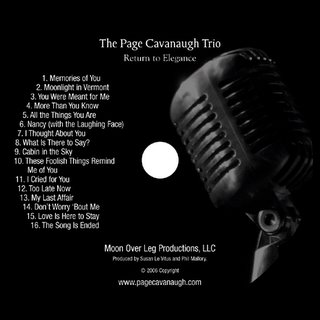
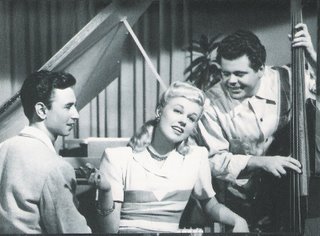
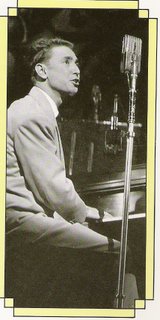
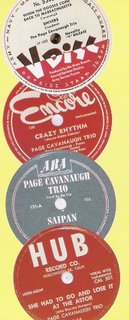

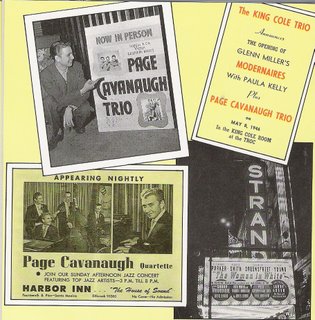
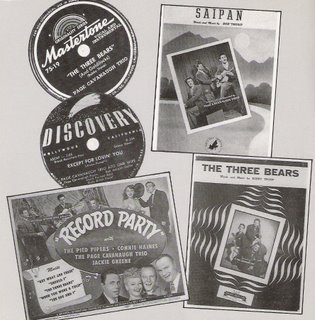
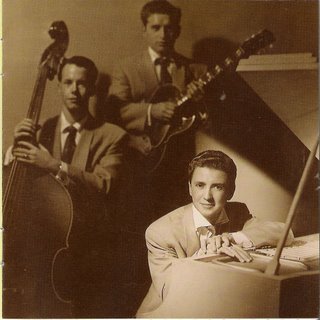
During the mid-1940s to early-'50s, Page Cavanaugh was more of a household name than he is this century. So much so, there's little doubt that when, in 1948 prior to starting to film her first feature, Romance on the High Seas, Doris Day was informed that Page would be her musical co-star in the production, she probably couldn't sleep or eat for a week. That's how big a deal he was back then.
Beginning in the mid-1940s, Page---along with Nat King Cole, Bobby Troup, Matt Dennis and Joe Mooney---played a major role in putting a whole new spin on the jazzier side of American Popular Music. Almost overnight, it had a lighter, breezier sound. Eventually, Cole became the most famous of the lot, and Cavanaugh, arguably, the least. Part of the "problem" (if that's what it is) is that, as the now octogenarian Page has probably been heard to say on more than one occasion: "I don't take meetings. I just play music." In other words, he hasn't much patience with all of the extra-musical considerations that go along with maintaining a career. But it's paid off in the long run. Over the last half-century, Page---especially in the Los Angeles area---has had all the work he can handle, appearing with his various (mostly) small group configurations in some of more swellegant locales in town. And, on occasion. . .well, a guy's gotta eat. If I had any say-so in the matter, for services above and beyond the call of duty to American music, he should receive the Kennedy Center honors. Instead, he's just. . .booked. Right now he commutes multiple times weekly back and forth between the lounge at the posh Tower Hotel lounge on the Sunset Strip and Orange County's Balboa Bay Club.
And pianist-whisper vocalist Cavanaugh (he loves that appellation) has a new CD, Return to Elegance, that is just about to be released. I've heard an advance copy, and it's one of the finest not only of his but anyone else's career. Here's just a brief snippet of the opening track. That does not sound like the playing of an 84-year-old. More like a 24-year-old.
Return to Elegance is the icing on the cake of his 60 + years distinguished recording career. I'll be writing more about it here in days to come, along with the inclusion of a few audio snippets, and ordering information.
Sunday, April 23, 2006
Pinky Winters charts!
There is a lot happening with singer Pinky Winters (I produce her recordings) right now. More December dates in Japan, including some big band appearances to be announced--along with a nice US date also TBA---and. . .
. . .this just in to our Post-Bop news room:
In the May issue of the Japanese jazz magazine, "Swing Journal," The Shadow of Your Smile: Pinky Winters Sings Johnny Mandel. . .with Lou Levy rests very nicely at lucky number 13 on the prestigious publication's jazz vocal sales chart.
This makes the second great musically-literate country, along with France (Pinky's Happy Madness CD), in which her albums have charted.
And to think that it seems like only yesterday I was a teen deejay in Hee-Haw Country hustling country and western Kitty Wells concerts. How bleak was my puberty! (mp3 link for a limited time only)
Here's a rare track, "The Nearness of You", from the 1950s of Pinky acccompanying herself---also rare---on piano. (mp3 link for a limited time only)
. . .this just in to our Post-Bop news room:
In the May issue of the Japanese jazz magazine, "Swing Journal," The Shadow of Your Smile: Pinky Winters Sings Johnny Mandel. . .with Lou Levy rests very nicely at lucky number 13 on the prestigious publication's jazz vocal sales chart.
This makes the second great musically-literate country, along with France (Pinky's Happy Madness CD), in which her albums have charted.
And to think that it seems like only yesterday I was a teen deejay in Hee-Haw Country hustling country and western Kitty Wells concerts. How bleak was my puberty! (mp3 link for a limited time only)
Here's a rare track, "The Nearness of You", from the 1950s of Pinky acccompanying herself---also rare---on piano. (mp3 link for a limited time only)
Saturday, April 22, 2006
Nuttin But a Commie Thang
Today's disc o' the day features Ming and the Mao-ettes performing "Sing of the Great, Glorious and Correct Communist Party of China." (mp3 links for a limited time only)
Thursday, April 20, 2006
Cat Blog Friday
I know I must be the last Ailurophile blogger on the planet to post this Funny Cats 2 . Still, I had never seen it before and there is a very slim chance that it might be new to you, too. Why do I feel just like Bob Saget?
Disc o' the day
When asked what he thinks of rap, legendary drummer-educator Max Roach replied: "People who voted for defunding of music education programs in public schools are getting what they paid for." Perhaps that also explains how American Idol became a top-rated TV show. And why terrific Brazilian-born Japanese singer-guitarist-songwriter Lisa Ono is a major star almost everywhere in the world except the U.S. Astrud Gilberto mitout tears.
Tuesday, April 18, 2006
Dr Chilledair's Archives

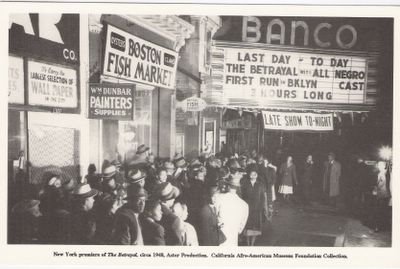
This is the post card sent in conjunction with two simultaneous exhibitions I curated in 1992 at the California Afro-American (now "African-American") Museum: Midnight Ramble: Seventy-five Years of African-American Movie Poster Art and Hollywood Days, Harlem Nights: African-American Entertainment in Los Angeles, 1940-1952. Ironically, this photo of a Brooklyn showing ---"last" and only day---of legendary black filmmaker Oscar Micheaux's final film, The Betrayal (1948), survives while the film is lost. And yet, silent films of his from the Twenties did withstand falling through the cracks of time. Note that the banner outside the theater proudly announces that the film is "3 Hours Long." A sure mark of quality! The post card incorrectly notes this is the New York premiere of the film, when it's initial showing was at midtown Manhattan's Mansfield Theatre.
My friend, actress-activist Frances E. Williams, appeared in two of Micheaux's screen melodramas, Lying Lips (1939) and The Notorious Elinor Lee (1940). The director's film's were notoriously low-budgeted affairs, and Langston Hughes while viewing Lying Lips at a theater with Williams one day and upon noting that in the movie she smoked non-filtered Camels all the way down to the end, turned to her and whispered, "What was your budget? Couldn't they even afford to buy you any cigarettes?"
Monday, April 17, 2006
Plus ca change....
Reading jazz pianist Kenny Drew, Jr's recent broadside against rap (not "rap music," puh-leese) on his web site, I couldn't help but be reminded of a letter to the editor of the NYT that I clipped from that paper more than a decade-and-a-half ago.
Don't Confuse 2 Live Crew With Black Culture
To the Editor
New York Times
June 25, 1990
As a black woman, I was appalled to read in Tom Wicker's June 14 column ("Home of the Brave") that the songs of the rap group 2 Live Crew contain "quintessentially black" lyrics. more
Don't Confuse 2 Live Crew With Black Culture
To the Editor
New York Times
June 25, 1990
As a black woman, I was appalled to read in Tom Wicker's June 14 column ("Home of the Brave") that the songs of the rap group 2 Live Crew contain "quintessentially black" lyrics. more
Sunday, April 16, 2006
Guest Blogger


DEAR ABBY: About four months ago, the house across the street was sold to a "father and son"---or so we thought.
We later learned it was an older man about 50 and a young fellow about 24.
This was a respectable neighborhood before this "odd couple" moved in. 'I'hey have all sorts of strange looking company. Men who look like
women, and women who look like men, blacks, whites, Indians, and yesterday I even saw two nuns go in there.
They must be running some sort of business, or a club. There are motorcycles, expensive sports cars: and even bicycles parked in front and on the lawn. They keep their shades drawn so you can't see what's going on inside but they must be up to no good, or why the secrecy?
We called the police department and they asked if we wanted to press charges! They said unless the neighbors were breaking some law there was nothing they could do.
Abby, these weirdos are wrecking our property values! How can we improve the quality of this once respectable neighborhood?
---Up in Arms
Dear Up: You could move.
Yesterday, Bessie; Today, Dusty
Here's a previous post about the late Dame Dusty Springfield. Today would have been her 67th birthday.
Saturday, April 15, 2006
Today is Bessie Smith's birthday
When I first met him in the mid-1980s, jazz trumpet and cornet player Demas Dean lived in L.A.'s mid-Wilshire area in a pleasant, neat, well-kept one-room apartment.
The walls of his abode were an arresting photographic who's who of black entertainment; with many of the photos having been personally inscribed to him from: Maxine Sullivan, Billie Holiday, Valaida Snow and Elisabeth Welch, et al. But of all his professional accomplishments, the one he liked most to talk about were the recording sessions he did with Bessie Smith; the first on February 9, 1928 with a second one almost two weeks later on February 21, for a total of six sides: "Thinking Blues," Pickpocket Blues," "I Used to Be Your Sweet Mama," "Standin' in the Rain Blues," "It Won't Be You," and "I'm a Cheater." Here is some of what he told me about the experience, as excerpted from my book "Hot from Harlem: Profiles in Classic African-American Entertainment."
_________________
No winner for Wednesday's "Blindfold Contest." The singer was the wonderful Shelby Flint, accompanied Tim Weston, guitar; Peter Erskine, drums; John Patitucci, bass
The walls of his abode were an arresting photographic who's who of black entertainment; with many of the photos having been personally inscribed to him from: Maxine Sullivan, Billie Holiday, Valaida Snow and Elisabeth Welch, et al. But of all his professional accomplishments, the one he liked most to talk about were the recording sessions he did with Bessie Smith; the first on February 9, 1928 with a second one almost two weeks later on February 21, for a total of six sides: "Thinking Blues," Pickpocket Blues," "I Used to Be Your Sweet Mama," "Standin' in the Rain Blues," "It Won't Be You," and "I'm a Cheater." Here is some of what he told me about the experience, as excerpted from my book "Hot from Harlem: Profiles in Classic African-American Entertainment."
_________________
No winner for Wednesday's "Blindfold Contest." The singer was the wonderful Shelby Flint, accompanied Tim Weston, guitar; Peter Erskine, drums; John Patitucci, bass
Friday, April 14, 2006
This JUST IN
A followup to Nick Clooney's article a week ago about singer Bill Black aka Clay Mundey in the Cincinatti Post.
Thursday, April 13, 2006
Lucy Ann Polk

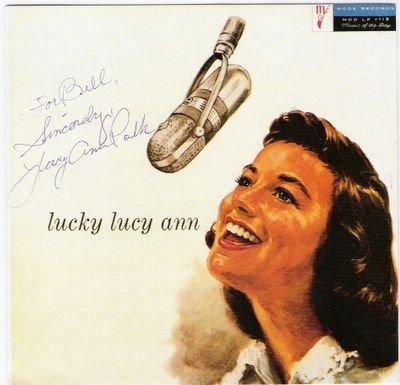
A reader writes in:
Bill,
Recently became a Lucy Ann Polk fan. When searching the web to find some info about her biography & discography I found the entry in your blog from September 18, 2005. You reported that you've met her and heard her sing. There is nothing about her life on the web, no biography anywhere (as far as Google results are concerned). So, can you provide me with a bio or some info? Many thanks in advance!
Best,
Siegfried
Dear Siegfried,
I don't know a lot about Lucy Ann. However, here's what I DO know. She began in show business in the mid-1940s as part of a singing family group, brothers and sisters I think. Her maiden name is Polk. They were called the Town Criers and joined the Bobby Sherwood orchestra in the mid-1940s. Floating around, there are radio transcriptions on commercial CDs of their performances with Sherwood. Also, she sang and recorded for quite a few years with the Les Brown Orchestra, off and on again beginning in 1950. I believe there are a number of Columbia Les Brown recordings featuring Lucy Ann. To the best of my knowledge, the only total solo album by her is Lucky Lucy Ann (1957), easily obtainable on the net. It is an excellent recording, with arr. by Marty Paich (you probably have that one). There is also an album with a number of performances by Lucy Ann on a CD entitled The Dave Pell Octet Plays Burke and Van Heusen. I have attempted to buy it---it is alleged to be in print---but have not been successful at obtaining it. Amazon.com claims that they "ship in one to two business days," but don't you believe it.
She has been married. Divorced? No children. I would guess that she is in her mid-seventies. A very, very sweet and delightful person. I cannot emphasize that too much. I see her once a year at a friend's Labor Day Party. I look forward to encountering her once again there this fall. She is now happily retired. I don't know too much more to tell you, except that amongst cognoscenti of jazz-based singing, and by her peers, she is considered---her semi-obscurity notwithstanding---to have few equals.
BTW there is a singer in Japan, I forget her last name, let's say it's "LucyAnn Kato," who bills herself as "Lucky Lucy Ann" and who does a Lucy Ann Polk tribute show!!! (And some of my friends wonder why I love that country so much.) I think she has even recorded a CD salute to Lucy Ann, but my memory is a bit hazy about that. I will tell Lucy about this, next Labor Day. I can't wait to experience her delighted reaction. Hope that helps.
Best,
Bill
(hear Lucy Ann ---mp3 links for a limited time only)
Wednesday, April 12, 2006
Blindfold Contest
It was a toss-up between guessing beans in a jar or a mystery vocalist. I finally opted for the latter. Guess who's singing "Alone Together" (mp3 link for a limited time only) and win a copy of my recent Japanese reissue production, "Tommy Wolf Can Really Hang You Up the Most" by Bobbi Rogers. email answers to: cllr1@comcast.net. The deadline is midnight Friday. Happy listening and good luck. We'll be right back. . .
Tuesday, April 11, 2006
duh duh duh. DUH DUH
Shortly after my article---entitled “Happy Birthday, Louie Louie: A Conversation with the Man Who Wrote Rock’s Most Carefully Listened-to Song"---appeared in the L.A. Reader in 1981, musician Richard Berry sued and won back three-quarters of the publishing rights to his composition, worth a significant amount of money. Not long after that, however, he passed away of a brain aneurysm. Proving once more, as if any further evidence were needed, that the universe is remorselessly random and devoid of any and all justice. As of 2004, with the exception of Lennon and McCartney's "Yesterday," "Louie Louie" has been covered more times than any other pop song (over 1,000 versions and counting). When this article was published a quarter-century ago, it was to celebrate the silver anniversary of "Louis Louie." Today it appears in honor of Berry's birthday. If Richard were still alive, he would be a mere 71-years-old this very day. To read the article, go here
Take---so to speak--- my life, please!
Take---so to speak--- my life, please!
Monday, April 10, 2006
Still on a birthday kick
Today is the post-mortem natal day of (screen) ghostest with the mostest dubber for the stars, Peg LaCentra (1910-1996). She sang for Susan Hayward in Smash-Up, the Story of a Woman. It drives me crrrrazeee when folks just call it Smash-Up. Doesn't it you? Or maybe you don't really care. But I digress as is my wont.
Among others, LaCentra also sang for Ida Lupino in Road House. Did some band singing, too. Primarily with Artie Shaw. But Shaw, it is said, never really liked singers; considered them a necessary evil. From Shaw she jumped to Benny Goodman's band for a brief time, but he didn't like anyone, and so LaCentra lasted only a few months there. In his excellent liner notes for the 2002 CD reissue of the bulk of LaCentra's recorded work, 45 tracks on two CD's, writer-reissue producer Ted Ono makes the above strong cases for the ultra-obscurity of LaCentra.
It is interesting and, in fact, downright noble that Ono's Baldwin Street label would go to the trouble of releasing a project such as this. But inasmuch as he considers Peg LaCentra "one of the most distinctive song-stylists of the Swing Era," obscurity notwithstanding, I guess he didn't have much choice. Still there appears to be a slim profit margin here. For Ono adds, "I believe that this is a significant release for jazz vocal collectors around the world even if there are only about 3,000 of us left." "Only," perhaps, but at what I would imagine to be at least 3.00 profit per disc, that's like having your idealistic cake and eating a slim slice of it, too. And, most likely, he won't end up burning in Bad Record Producer Hell, forced to listen over and over for an eternity to a tape loop of the inchoate brayings of a Jessica Simpson or somesuch. But I digress.
LaCentra was married to the actor Paul Stewart (Citizen Kane, etc.).
Among others, LaCentra also sang for Ida Lupino in Road House. Did some band singing, too. Primarily with Artie Shaw. But Shaw, it is said, never really liked singers; considered them a necessary evil. From Shaw she jumped to Benny Goodman's band for a brief time, but he didn't like anyone, and so LaCentra lasted only a few months there. In his excellent liner notes for the 2002 CD reissue of the bulk of LaCentra's recorded work, 45 tracks on two CD's, writer-reissue producer Ted Ono makes the above strong cases for the ultra-obscurity of LaCentra.
It is interesting and, in fact, downright noble that Ono's Baldwin Street label would go to the trouble of releasing a project such as this. But inasmuch as he considers Peg LaCentra "one of the most distinctive song-stylists of the Swing Era," obscurity notwithstanding, I guess he didn't have much choice. Still there appears to be a slim profit margin here. For Ono adds, "I believe that this is a significant release for jazz vocal collectors around the world even if there are only about 3,000 of us left." "Only," perhaps, but at what I would imagine to be at least 3.00 profit per disc, that's like having your idealistic cake and eating a slim slice of it, too. And, most likely, he won't end up burning in Bad Record Producer Hell, forced to listen over and over for an eternity to a tape loop of the inchoate brayings of a Jessica Simpson or somesuch. But I digress.
LaCentra was married to the actor Paul Stewart (Citizen Kane, etc.).
Sunday, April 09, 2006
Paul Robeson's Birthday is today

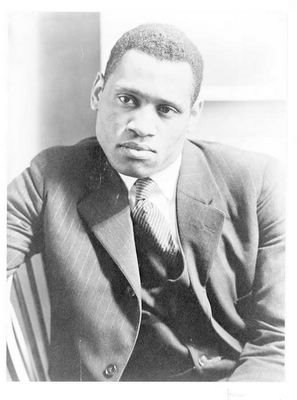
Paul Robeson
I have always found it a bit perplexing that African-American musician Hazel Scott has never been given the proper credit she deserves for taking on the House Un-American Activities Committee several years in advance of Edward R. Murrow's widely-heralded attack on Joseph McCarthy (see Good Night, and Good Luck). But that's another story. I find it almost as odd that another of the bravest acts committed against mid-century Communist witch-hunting, enacted by Paul Robeson, has also been given scant shrift in the history of such, ahem, activities. It happened in 1949 when my friend, the late actress-activist Frances E. Williams, produced a rally in support of then-beleagured Renaissance man Robeson at Los Angeles' Embassy Theater. Muzzled by the government from giving a political speech, Robeson sang his message to the accompaniment of a string quartet. Federal agents stationed around the auditorium were either powerless to stop him or else, too slow up on the uptake to realize what was going on. Would that make a great scene in a movie or what? Here is an audio recollection of the occasion by musician Buddy Collette--something of a political pioneer himself---who was on hand to witness, and take part in, Robeson's surreally seditious act. It is taken from Buddy's CD, A Jazz Audio Biography. (mp3 links for a limited time only).
Saturday, April 08, 2006
I think he liked it. . .
More nice coverage of recent SSJ Records releases. See also last Wednesday's entry here.
Friday, April 07, 2006
Thursday, April 06, 2006
MORE Oblivion Towers Tape Vault Rarities
Late 1960s Top 40 Radio sendup by a friend of mine. (mp3 links for a limited time only)
Wednesday, April 05, 2006
A heads up. . .
. . .a nice article about the Two Bills---Black and Reed (that's me)---in today's Nick Clooney column in the Cincinnati Post.
Oblivion Towers Tape Vault Rarities
Recently discovered alternate take of one of the great hits of the 1950s. (mp3 links for a limited time only)
Tuesday, April 04, 2006
Birthday Greetings to the Great Beyond
No history of World War II would be quite complete without reference to the many hundreds of performers who toured the front lines and trenches entertaining the troops. Bob Hope is the name that most readily springs to mind, but running a close second is, undoubtedly, blonde, honey-voiced (and highly underrated) vocalist Frances Langford (1914-2005). During the wars years, every possible moment away from her busy film-recording-radio career was spent boosting the morale of service men and women. she sang in many far off locales (often with exotic names like Bizerte and Kairoun) too numerous to mention. She was the sweetheart of hundreds of battalions, squadrons and fleet units, and few were the soldiers who did not see and hear her in person sometime during the war. As for her professional life stateside, it included appearances in several dozen films with such evocative titles as "Too Many Girls," "Swing It, Soldier," "Dixie Jamboree," and "Hollywood Hotel"---as well as continued radio performances, most notably with Rudy Vallee. In more recent years, Langford is fondly (?) remembered as the nagging shrew (opposite Don Ameche and, later, Lew Parker) of the popular radio, TV and recording series, The Bickersons.
In 2002 I visited my sister in south Florida and was happy to learn that Langford was still with us and resting comfortably on her patriotic laurels, a very rich lady (she married well) living on a forty acre estate on the Indian River, overrun with peacocks. She died a few years later, but not before waging her own personal zoning war to allow the peacocks to remain on her grounds. I’m not sure who won, but I was rooting for Frances and her birds. Here’s a rare track that demonstrates how good a singer she was. (mp3 links for a limited time only)
In 2002 I visited my sister in south Florida and was happy to learn that Langford was still with us and resting comfortably on her patriotic laurels, a very rich lady (she married well) living on a forty acre estate on the Indian River, overrun with peacocks. She died a few years later, but not before waging her own personal zoning war to allow the peacocks to remain on her grounds. I’m not sure who won, but I was rooting for Frances and her birds. Here’s a rare track that demonstrates how good a singer she was. (mp3 links for a limited time only)
Monday, April 03, 2006
Sunday, April 02, 2006
Happy birthday, Marvin Gaye
Today is Marvin Gaye's birthday. Mine, too. Gaye, Sam Cooke, Jackie Wilson, Jessie Belvin, et al. They all wanted the credibility that singing the Great American Songbook would bring them. Not that there's anything wrong with “Bring It On Home to Me,” “I Heard It Through the Grapevine,” “Higher and Higher,” and “Goodnight, My Love.” Early in Marvin Gaye's career, he had a one-for-me, one-for-them arrangement with Motown, i.e. an album of standards, an album of funk, ad infinitum. But that quickly fell by the wayside after the first couple of hits like “Hitchhike” and “Mickey’s Monkey.” Just as well; even with arrangements by the likes of Ernie Wilkins and Melba Liston, the standards album (Hello Broadway, When I'm Alone I Cry, etc.) weren't very effective. The most arresting example of this "schizophrenia" that befell most of the big male African-American non-jazz singers of that era is the posthumously released Gaye album, Vulnerable. On it he sings standards, mostly double-tracked vocals, with arrangements by Bobby Scott. In a very schematic manner, one vocal track is done in a very conventional male crooner fashion, while the one layered over it is sung in Gaye's usual r 'n b style. Without realizing it, he had pioneered a new, hybrid, minor genre of American Pop. And a one-off at that! I wonder if Gaye ever fully comprehended, before he died, just how personally revealing this amazing document is? more
Subscribe to:
Comments (Atom)






